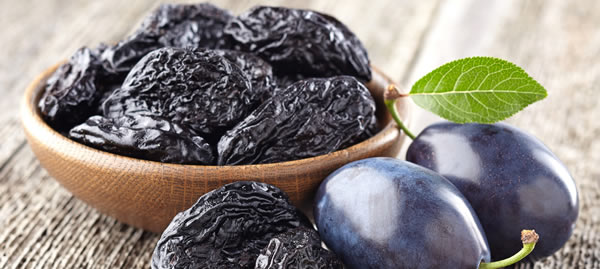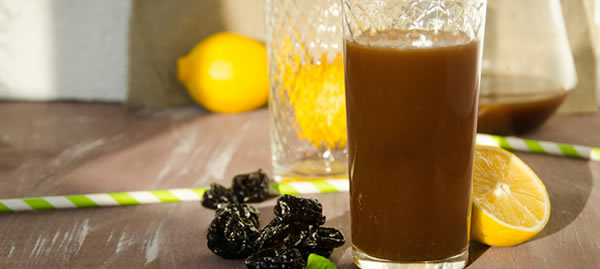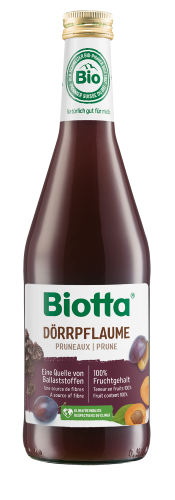What are prunes?
Prunes are dried plums. Only certain varieties of plums are used to make prunes (they have a particular sugar content which stops them fermenting) and these are harvested and gently dehydrated. They sweat it out (excuse the pun) in temperatures up to 100°C for 12-24 hours they reach the desirable end result - the distinctive, shrivelled little prunes we know and love so well.
Wait, so do we really love them or do prunes just bring back nasty bowel-associated memories of your granny trying to force-feed you prune juice? There is some stigma attached to this, but you need to understand she was doing it for good reason! The popularity of prunes, or ‘dried plums’, is on the rise again and here I explain why.
How is prune juice made?
Bearing in mind prunes are dried fruit, prune juice isn’t generally prepared in the same way as other fruit juices as there isn’t much juice to be squeezed out!
Prune juice is prepared by boiling the prunes in water for up to 12 hours, essentially rehydrating them at first, but over time the beneficial components leach out into the water. The solid material is strained off and there we have it, prune juice.
Then, when it comes to Biotta’s Prune Juice it's quite unique in that the plum juice is mixed with some prune puree, so there’s a good dose of fibre left in there - a vital element when it comes to helping your bowel to move, not to mention some other tasty elements including grape juice and apricot puree.
How do prunes help with constipation?
Prunes have traditionally been used to support the functions of our bowels (especially useful for those that are particularly slow-moving). Up to 10% of the population are thought to suffer from constipation on a regular basis and some recent surveys at A.Vogel suggest that this number could be even higher – yikes!
We now know that one reason for the constipation-curbing effects of prunes is their high dietary fibre content. See, a low-fibre diet lacking in fruit and vegetables is very likely to contribute to sluggish bowels.
Now, just a quick recap on fibre. There are two types of dietary fibre – soluble and insoluble fibre – and prunes contain both. The insoluble fibre is particularly useful for giving slow-moving bowels the kick-start they need.
Insoluble fibre is the roughage left over from our food that we can’t digest properly. This indigestible element found in many fruit and vegetables, travels through the stomach and small intestine without being absorbed and ends up in our large intestine. The presence of this additional roughage distends the gut wall and triggers peristalsis. Peristalsis is a series of wave like contractions produced by the smooth muscle in the walls of our gut which effectively moves food waste from one end of the digestive tract to the other.
In addition to dietary fibre, prunes and their juice also contain sorbitol. Sorbitol is what is called a sugar alcohol which is another important indigestible component prunes can add to their list. The presence of sorbitol in the large intestine causes what’s called an ‘osmotic force’ and water is secreted into the gut in response to its presence. This loosens stools and helps them to get moving.
Finally, a third, important constipation-busting component of prunes is called diphenyl isatin. Diphenyl isatin is a natural laxative and works to gently stimulate movements of the bowels.
So, it seems that all of these important components of prunes may work well together to help give you some relief from your toilet troubles.
Do prunes have any additional benefits?

As well as helping our bowels along, prunes may offer some other health benefits. Now, we’ve discussed the fibre content of prunes, having focused on the effects the insoluble fibre can have on your bowels. But let’s not forget about the soluble fibre content. Soluble fibre also offers a host of benefits, one to mention is the cholesterol-lowering effects it can have.
Soluble fibre can absorb up to 200 times its own weight in water. As it does this, it forms a gelatinous mass in your gut which oozes through your digestive system, consuming any substances that stand in its way. This can be beneficial for us for a number of reasons, but one beneficial effect is that on cholesterol levels and your body can manage this at it processes bile. See, bile is formed by the liver, stored in the gall bladder and released in response to us consuming fat. With enough fibre in our diets, bile is soaked up and ends up leaving our body entangled in some nice soluble fibre, which eagerly awaits it. As a result your liver has to produce more bile and uses up the cholesterol you have circulating your body to do so. Result!
A good soluble fibre content (aim to have some in every meal) can also help to slow the absorption of glucose. This can have positive effects on your blood glucose which of course, is always a bonus.
Prunes are also rich sources of antioxidants, vitamin K, boron and potassium. Studies have shown that prunes may actually help to protect your bones and may have some distinct effects on post-menopausal women, where decreasing bone density is more of a worry1. Wow, who would have thought it! Hurray for the humble prune indeed.
Theories surrounding the positive outcome prunes may have on our bones, also suggest that the impressive antioxidant content of prunes may be partly responsible for these effects as they are able to scavenge damaging free radicals (this is of benefit to all cells of the body not just bones!). However, boron and vitamin K may also be key players as we know they can have specific interactions with calcium and bone mineral density. It seems likely the unique combination of vitamins, minerals and antioxidants together in prunes are contributing to such outcomes.
So, this is definitely something to consider – especially for all you women out there who are going through the menopause the health of your bones is often top of mind.
Whole fruit versus the juice
So how do the benefits of prunes become augmented when made into a juice?
During the process of converting prunes into prune juice, beneficial agents such as sorbitol are retained, as are phenols including diphenyl isatin, although some of the fibre is lost.
However, what is lost is replaced with an additional liquid element which is generally useful in constipation. Being liquid, prune juice passes more quickly through your digestive system (carrying its beneficial agents with it) and a prompt, pronounced effect can be had on the bowels.
Therefore, prune juice may be helpful for some more instant relief when it comes to constipation, then adding some whole prunes to your daily diet alongside plenty of water, may be a positive step for helping to keep your bowels moving more regularly, day-to-day.

Are there any other options for constipation?
Prunes or prune juice may well be one of the best remedies out there for constipation. Gently stimulating the bowels and potentially offering some additional health benefits while they’re at it, what’s not to like?
However, it has to be said, prune juice probably isn’t the most popular remedy out there, possibly because of the stigma attached to it, or is it the, let’s say, slightly acquired taste (however, you definitely need to try Biotta's new blend before jumping to assumptions), so are there any other options?
Another popular remedy out there for constipation that you may of heard of is psyllium husks. Psyllium husks in comparison to prune juice or linseeds are primarily made up of soluble fibre. Soluble fibre can be useful in some situations but it can make constipation worse if you aren’t careful. Soluble fibre absorbs water, therefore it can dry out stools even more - this is the last thing we want! Therefore, if taking psyllium husks, just be sure to drink lots of water alongside it. Psyllium husks can actually also be useful in the treatment of diarrhoea for this very reason.
Finally, the pharmacy or doctor should still be a last resort for anyone suffering from long-term constipation. Prescribed or even over-the-counter laxatives can be severe, unnecessary and are unlikely to have the nice addition of naturally occurring vitamins, minerals and antioxidants, so just beware that these shouldn’t be a long-term solution. Should we always assume medications are the way forward? Not always; we should be appreciating the products of nature which may well be offering us a just as effective solution!
1. https://www.ncbi.nlm.nih.gov/pmc/articles/PMC5409740/
Originally published on 05/08/16, updated on 02/10/18







